- About Us
- Columns
- Letters
- Cartoons
- The Udder Limits
- Archives
- Ezy Reading Archive
- 2024 Cud Archives
- 2023 Cud Archives
- 2022 Cud Archives
- 2021 Cud Archives
- 2020 Cud Archives
- 2015-2019
- 2010-2014
- 2004-2009
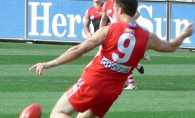 |
Between The Posts |
Some things in life are entered into relatively easily. House and car purchases, career choices, relationships, voting, the decisions to fight-or-flight in a back alley showdown or to hold-em or fold-em in poker. They all seem to be routine choices when compared with the fateful choice of which AFL team you support when you move to Melbourne, Australia. While getting on board with the team is easy enough, perhaps likened to the purchase of a second hand watch from a pushy seller, the implications of the decision are serious and long lasting. It can completely shape your time in Australia’s great southern city. For example, social groupings can be made along AFL lines, friendships made and lost, and, given the length of the season you could spend half the year in disappointment if your team is on the wrong end of the ladder. The place is literally footy mad - everyone is into footy and there is very little chance of escaping it. Every weekend thousands and thousands of punters converge on the MCG in their tribal colours and on the following Monday the results are all that is discussed.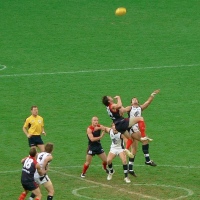
This story plots one punter’s journey to choosing an AFL team in footy-mad Melbourne. It should be said from the outset that it is written from the perspective of an out-of-towner blown in on the breeze. Therefore, the views expressed differ from those of a long-term resident or a born and bred Melbournian. For these latter folk, family traditions and local loyalties run deeply. By contrast, the newbie to the scene can assess the AFL market unencumbered by such weighty factors, and can make an objective decision without the risk of excommunication from their family and friends.
Who-dya-gofer?
When you arrive in Melbourne with no footy team, people have an uncanny sense that you are fresh meat for the AFL-taking and they get ready to swoop. Be it friends and work colleagues, the taxi drivers, people on trams, switchboard operators, sales assistants or the proprietor of the local coffee shop – they are waiting for you and they are ready to peddle their dastardly trade in the hope of growing their team’s numbers...
On my first day in Melbourne I was out for beers with a friend and we discussed numerous Melbourne topics – the weather, the tennis, girls, cricket and the AFL. At some point in the conversation he grew serious, and he tapped the table with his right index finger and said: “c’mon mate, who is it? Who-dya-gofer? Carn mate!” I later realised the error, but in those tender days my only response was to answer it truthfully: ”No one yet mate”. “Well-thats-it-mate, yer-gonna-go-fer- Richmond, awright?” and with that I was pulled into a beer-soaked, sweaty embrace followed by a playful knee to the groin as the bar erupted in approving roars. I was sent for more beers, clutching injured body parts as I went. It was apparent that his AFL decision on my behalf was worthy of some reward. As I looked into his bloodshot eyes, I momentarily believed him. Perhaps I felt like I had come home, or perhaps I was just lonely in a new town, because at that point I was willing to buy into Richmond. Maybe it was the beers consumed or it was the unruly man-love that sealed the deal.
By way of background, I have had a crack at everything in sports and mostly came up short. You know, the perennial journeyman, the second pick/utility player and perpetual battler, most improved etc, but it never dampened my enthusiasm. I have learnt over the years that you can do OK in any sport if you can control and pass a ball, maintain a safe, predictable set of hands, and can tackle with reliable enthusiasm and most of all, if you turn up to training, knock over your fair share of beers and hold your own around a barbecue. And of course, you never give up.
Thus on that beer-drenched Sunday arvo, in light of my own meagre sporting achievements it seemed that the Richmond Tigers fitted like a well-worn glove, pre-loved and warmed in mediocrity. Like a seat reserved at the table of average-ness where my mate and I found ourselves seated.
Once the beer-induced fogginess receded, common sense kicked in. I realised that I have experienced enough average sporting moments of my own: on field, pitch, on-court, mid-ships in a crew-boat and clinging to the edge of a mountainside. In selecting an AFL-side should I be seeking out the same or should I look for something special? Shouldn’t I be looking for something to lift me from the well-worn path of sporting obscurity and temporarily into sporting greatness? A time to shine, momentarily, and forget the dreariness of life for an afternoon.
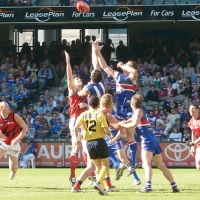
In my first few months in Melbourne these AFL “transactions” with AFL predators, as I grew to name them, played out many times. The barber would ask as he held the razor to my sideburns. My boss would ask me prior to my performance review. The lady on the end of the phone taking my cab booking and the cab driver himself would have a crack (while intently focussed on my answer and not on the road). The infamous Carlton-loving barista and the bloke pulling beers at the local all ask: “Who-dya-gofer?”. I began to realise this was a word in its own right for Melbournians that supplanted ordinary greetings in conversation. I am sure that it will be added to a dictionary somewhere and taught in schools:
Dictionary entry: who-dya-gofer ~ South East Australian tribal greeting. Note: answer carefully.
Another Sunday afternoon, another friend took me for a drive around town as a gesture of hospitality, a mini-tour of sorts for the new arrival to the city. We were driving around the Melbourne suburb of Carlton. My friend is an experienced investment banker known to friends and colleagues simply as “the Duke”. As the big Italian leisurely steered with one hand, the 2011 model 7-series Beemer crawled stealthily through the back streets. He leaned over to me and said: “this is my turf, my family owns this place (a few moments of silence)... Have you picked a team yet?”.
“No”, I said as I shifted uneasily in the passenger seat. I couldn’t tell whether he was carrying a gun but I thought to play it safe.
“The blues are your team now mate” he said, so close that I received my quota of garlic breath for the next week.
Choosing your team is an investment
Choosing the AFL team is a bit like an investment. In financial theory, the value of an investment is measured by its return over time compared with its purchase price including the cost of financing. The return consists of two key components: the cash flow you extract from the investment and the (hopefully) positive price differential over the purchase price that you receive when you sell it in the future. Critically, you discount the future values into an estimate of their present value, because you value the money you have today for immediate needs, more than the money you will have in future. In AFL terms, this year’s winning performance is more enjoyable than a good turnout in six or seven years time.
The gains from the AFL investment are not quite monetary. Rather it is more about how you feel at the start of a week after the round just passed, how you feel when you leave the football stadium on a Saturday arvo. Do you feel like happily playing with the kids or do you feel like kicking the cat out the backdoor (with greater accuracy than the woeful display you have just witnessed from your own team)? Will the season be a rollercoaster of disappointment, manifested by slamming down beers in suburban pubs, frustrated ciggie-breaks out front during quarter time, fights with your friends and endless Monday taunting from the bloke that pulls your coffees? In this scenario, the season ends early and your team’s players are already being arrested in Bali for misbehaving on the end of season trip while your friends are sharing high-fives and smoking cigars as their teams sail into the finals.
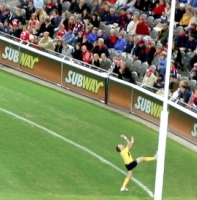
Or, do you choose the gold-plated, silver lined and cushioned road to glory? Weekends of victory will cap off weeks of confidence-driven domination at work. You leave the pub with smug-satisfaction every Saturday arvo while your mates brawl over what could-ve-been or might-ve-been and drown their sorrows in endless pints. In this golden winning zone you typically gloss over the cab-driver’s soul-searching and scoff at the barista’s losses on a Monday morning (while he spits in your coffee). You start the week refreshed, relaxed and feeling superior to your friends and work colleagues because you are on the winning team yet again.
As I looked into the bloodshot eyes of my Richmond-loving mate in the Pub on that late summer afternoon on my first day in Melbourne, I should have seen the years of disappointment, the sleepless nights, the smoking and alcohol habits, and the years in the football wilderness that accompanied his tragic Richmond-addiction.
It should be said that the finance motto of “buying in cheap” (sell dearly) does not really extend to the AFL team – there’s no guarantee that crap performance will turn into stunning victories due to a season-long “development program” or some other miraculous turn in fortune as the converted supporter of a consistently-losing team will have you believe.
Your AFL decision is also a social investment. For example if you choose Collingwood, you have probably excluded yourself from most social occasions for the foreseeable future.
The selection
I had to pick a team. I surveyed the field of possible choices. As I said, Collingwood was ruled out immediately. The team seems to be universally despised – and this could be a function of the reputation of their supporters, or that of their smoother-than-silk CEO who seems to show up everywhere from hosting game shows to TV adds.
The market: the competition consists of 17 teams (18 to play in 2012), 24 rounds and a finals playoff series (that’s more than half of the year). The teams are generally regionally representative. The competition, thought to have commenced in the mid 19th Century (1859 but it is still under debate, officiated around a bar somewhere), was originally Melbourne-only but has grown to include teams from most Australian states. The AFL Grand Final, held in September each year, is the largest attended club championship event in the world.
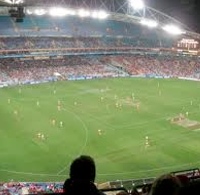
Each team comes with its assortment of injuries, coaching dramas, off-field demeanours, drugs, Underbelly*-connections, sex-scandals, salary-cap-rorts and betting controversies. Your tolerance for discomfort is therefore also a factor in the decision of which team to support. For example, a win is great, but if it is accompanied by your team going on a street-rampage and destroying the neighbourhood or worse, resulting in a rebuke from the Prime Minister, you can discount that. This ruled St Kilda out. They are a good team, no doubt, but the sordid details of their off-field antics from seasons 2009 and 2010 have written them off for the next five years in my view. I’ve seen these guys slobbering all over the locals in a Hong Kong nightclub after season’s end, some of them barely able to stand, some of them gently swaying from side to side on the dance floor while ogling every girl in their radius. For another team, a few years ago a prominent player went completely off the rails and went on a rampage that included sleeping with team mates’ wives, glassing his girlfriend and hitting policemen on an overseas trip. One team was tainted by their star performer stealing a car, high on drugs, then swimming across a river and hiding out in a suburban KFC to avoid his police pursuers (fries with that?). Such is the class that can accompany your chosen team...
Team performance - as measured by the position on the ladder and the performance in the play-offs. For me this is a prime consideration but it does not seem to be a consistent theme among supporters. For example, even the crappest teams have an army of loyal supporters that turn up week in and out, fully decked out in club kit, screaming like crazy, losing and coming back next week. There are a handful of teams that last season were nowhere even near contention to make the play-offs, and this has been their case for the last few seasons (at least).
Your investment time horizon is also important. The decision if you are in Melbourne for a year is different from that made if you plan to stay there for life. Many teams are 10+ years away from coming good, their last form was in the 60’s and their performance cycle seems to move in geological time. I could therefore leave out some other teams just for lack of performance over my AFL investment horizon. Each team will no doubt see their time in the sun, or has seen better days, and made it to the 1960’s grand final or won in ’48 (could come good by 2020).
There are teams that are warm and friendly, those that that sit nicely and snugly within the middle of the range and if you are after the comfort of something pre-knitted and warmed then they are for you. There is little in the way of expectation for these teams and therefore there is less disappointment. Unless you risk excommunication from your friends and family for picking someone else, there is little incentive to buy in. These middle of the roaders include Western Bulldogs, North Melbourne and Adelaide.
There are the disappointers, the teams that showed early promise but have failed to deliver the goods for years, leaving their supporters with nothing and holding out for a return to form like the second coming: Richmond Tigers, Brisbane Lions, Melbourne Demons. Interestingly, the Melbourne Demons supporters, despite their team being woeful, have an upper crust air about them.
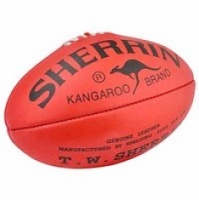
There are the consistent performers – the teams that in recent years have generally placed pretty well and tend to get through the season without too much fuss. Geelong, Carlton, Essendon, Sydney, Hawthorn, West Coast Eagles fall in this category. Geelong receives a special mention because this year they squared up against Collingwood in the Grand Final, which means that 99.9% of Australia barracked for Geelong on the day.
Another class of team falls in the “WTF/NFI” category: Gold Coast Suns, Port Adelaide Power and Fremantle Dockers. These are teams so new or from so far away that no one really knows anything about them or cares much.
The endgame
With the season drawing near and tension mounting from a Star Wars bar of Melbourne folk applying liberal amounts of AFL pressure, I was pressed to make a call. Around me, the hundreds and thousands of AFL-mad Melbournians had already found their spiritual homes. I began to feel that I would have been better prepared if I had received an AFL initiation kit supplied from the relevant authorities when I crossed the Victorian border. My own early experiences weighed heavily on me. I pictured Duke driving around the streets of Carlton after dark in his 7-series Beemer, handling a small pistol while fluffy Blues-supporters dice hung below the driver’s mirror. I thought of my Richmond mate peering hopefully over his pint, desperate for someone with which to share his AFL-burden. I considered the groin injury from that Sunday afternoon. I remembered the barista, the taxi-drivers, the barber and the faceless people on the end of phone-lines offering AFL-related advice. I recalled countless conversations in all locations with people trying to convince me to join their team. I finally made the fateful decision late one night, when the hours had grown long and the whisky in front of me short. After much soul-searching and weighing up of options, I made the call.
And with that, the following weekend I found myself wearing a gaudy, vertically-striped jersey, standing beside a bunch of footy nutters, pretending I knew the words to a team song and barracking for the...
*Underbelly is an Australian television show that popularised the gangland underworld of Melbourne.
Cameron O’Neill works in banking and recently arrived in Melbourne.
